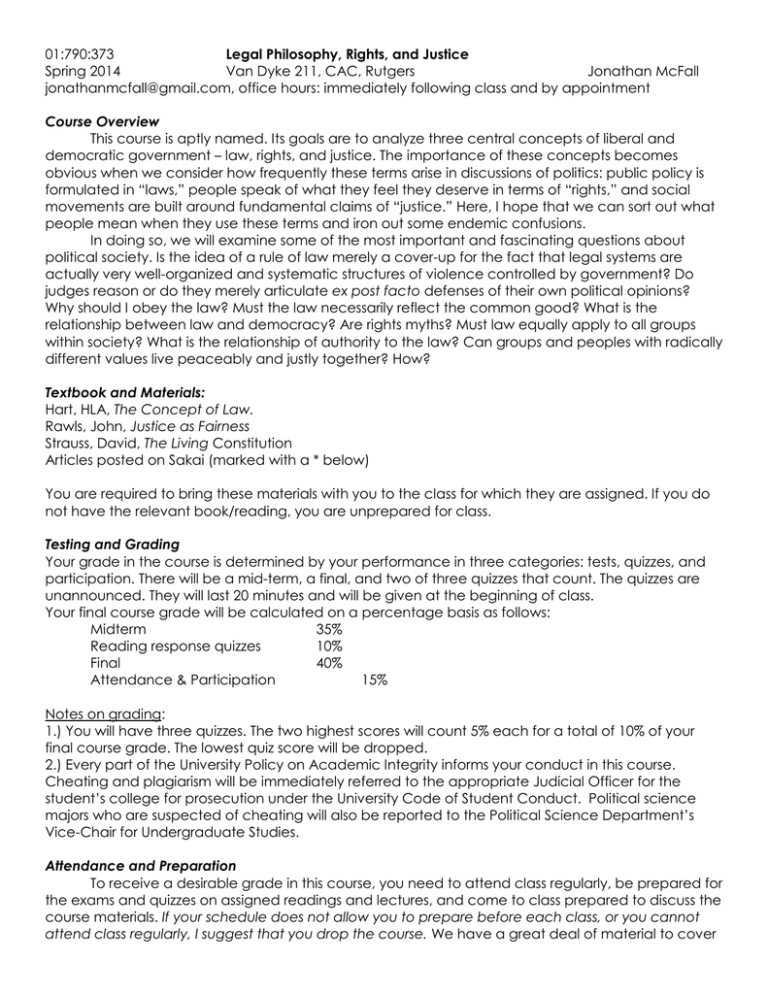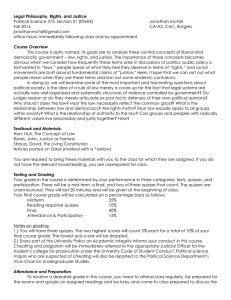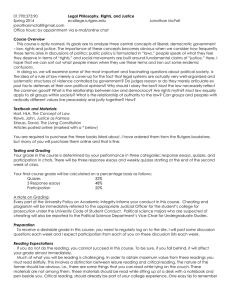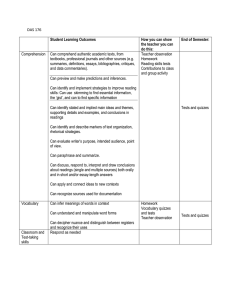01:790:373 Spring 2014 Van Dyke 211, CAC, Rutgers
advertisement

01:790:373 Legal Philosophy, Rights, and Justice Spring 2014 Van Dyke 211, CAC, Rutgers Jonathan McFall jonathanmcfall@gmail.com, office hours: immediately following class and by appointment Course Overview This course is aptly named. Its goals are to analyze three central concepts of liberal and democratic government – law, rights, and justice. The importance of these concepts becomes obvious when we consider how frequently these terms arise in discussions of politics: public policy is formulated in “laws,” people speak of what they feel they deserve in terms of “rights,” and social movements are built around fundamental claims of “justice.” Here, I hope that we can sort out what people mean when they use these terms and iron out some endemic confusions. In doing so, we will examine some of the most important and fascinating questions about political society. Is the idea of a rule of law merely a cover-up for the fact that legal systems are actually very well-organized and systematic structures of violence controlled by government? Do judges reason or do they merely articulate ex post facto defenses of their own political opinions? Why should I obey the law? Must the law necessarily reflect the common good? What is the relationship between law and democracy? Are rights myths? Must law equally apply to all groups within society? What is the relationship of authority to the law? Can groups and peoples with radically different values live peaceably and justly together? How? Textbook and Materials: Hart, HLA, The Concept of Law. Rawls, John, Justice as Fairness Strauss, David, The Living Constitution Articles posted on Sakai (marked with a * below) You are required to bring these materials with you to the class for which they are assigned. If you do not have the relevant book/reading, you are unprepared for class. Testing and Grading Your grade in the course is determined by your performance in three categories: tests, quizzes, and participation. There will be a mid-term, a final, and two of three quizzes that count. The quizzes are unannounced. They will last 20 minutes and will be given at the beginning of class. Your final course grade will be calculated on a percentage basis as follows: Midterm 35% Reading response quizzes 10% Final 40% Attendance & Participation 15% Notes on grading: 1.) You will have three quizzes. The two highest scores will count 5% each for a total of 10% of your final course grade. The lowest quiz score will be dropped. 2.) Every part of the University Policy on Academic Integrity informs your conduct in this course. Cheating and plagiarism will be immediately referred to the appropriate Judicial Officer for the student’s college for prosecution under the University Code of Student Conduct. Political science majors who are suspected of cheating will also be reported to the Political Science Department’s Vice-Chair for Undergraduate Studies. Attendance and Preparation To receive a desirable grade in this course, you need to attend class regularly, be prepared for the exams and quizzes on assigned readings and lectures, and come to class prepared to discuss the course materials. If your schedule does not allow you to prepare before each class, or you cannot attend class regularly, I suggest that you drop the course. We have a great deal of material to cover and there will be no back-tracking for those who fail to keep up. More important is that this subject matter is cumulative, i.e., the facts and concepts from the earlier readings and lectures are critical to understanding the topics of the later class sessions. In addition to showing up, you have to actually “be” here in order to get the better grade. Sitting and staring in stony silence is not an effective strategy for this class. If you participate you will learn more and enjoy the class more. Learning involves a two-way flow of information between teacher-student, student-teacher, and student-student. You thereby are required to contribute to the class discussion, either voluntarily or when called on. I recognize the possibility that speaking in class may be uncomfortable for some of you, but, still, oral expression is a necessary skill for life – a skill that college should impart. Everyone must speak up in class and, to that end, I will call on you dialogue style. When I call on you, I anticipate that you will be familiar with the topic and reading material for the day. If you are genuinely afraid of speaking in class, talk to me in order to discuss an alternative mode of participation. Be aware, though, that 10% of your final grade (the difference, for example, between a D and a C or a C and a B) will be based on our evaluation of your participation in, and contribution to, the class experience. I also strongly encourage the formation of study groups. If you have done the reading, participating in a study group with other students who have also completed the reading is an excellent way to prepare for the class assignments. Reading Expectations If you do not do the reading, you cannot succeed in this course. To be sure, if you fall behind, it will affect your grade almost immediately. Much of what you will be reading is challenging. In order to obtain maximum value from these readings you must read skillfully. This involves a distinction between leisure reading and critical reading. The nature of the former should be obvious, i.e., there are some things that you can read while lying on the couch. These materials are not among them. These materials should be read while sitting up at a desk with a notebook and pen beside you. Critical reading, should already be part of your college experience. Course Schedule and Reading Assignments January 21 Introduction, discussion of the syllabus and themes of the course January 23 Legal Reasoning, Levy, Edward H., excerpt, An Introduction to Legal Reasoning* January 28 excerpts from Aquinas, Summa Theologica* January 30 Modern Natural Law, Finnis, John, “Natural Law Theories”* February 4 Lecture 1 from Austin, John, Province of Jurisprudence Determined*, Hart, HLA, The Concept of Law, ch. 1-3 (1-49) February 6 Hart, HLA, The Concept of Law, ch. 4-6 (50-123) February 11 Hart, HLA, The Concept of Law, ch. 8-10 (155-237) February 13 Legal Realism; Holmes, OW, “The Path of the Law”* February 18 Posner, Richard, “The Law and Economics Movement”* February 20 Hart, HLA, The Concept of Law, ch. 7 (124-154) February 25 Dworkin, Ronald, “The Model of Rules 1”* February 27 Hart, HLA, The Concept of Law, Postscript (238-276) March 4 MIDTERM March 6 Williams, Patricia, Alchemy of Race and Rights excerpt* March 11 Minow, Martha, “When Difference Has Its Home” excerpt* March 13 Kennedy, Duncan, “Legal Education as Training for Hierarchy”* March 25 Scalia, Antonin, A Matter of Interpretation* March 27 Strauss, David, The Living Constitution, (1-49) 2 April 1 April 3 April 8 April 10 April 15 April 17 April 22 April 24 April 29 May 1 TBA Strauss, David, The Living Constitution, (51-139) Segal, Spaeth, and Benesh, The Supreme Court in the American Legal System* Hart, HLA, “Are There Any Natural Rights”* Dworkin, Ronald, “Taking Rights Seriously”* Aristotle, excerpts from Nicomachean Ethics* Rawls, John, Justice as Fairness (1-79) Rawls, John, Justice as Fairness (80-134) Rawls, John, Justice as Fairness (135-202) Feinberg, Joel, “The Expressive Theory of Punishment”* Wrap-up & Review for Final FINAL, 8 pm 3



